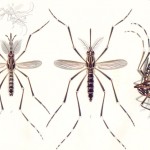by Catherine Haug, August 15, 2013
(photo, right from Wikimedia Commons)
Our readers believe in using organic methods to feed their gardens, but do we all walk the talk? Do we share our belief, our method with our neighbors? Do you compost your food and garden waste, then use it to augment your soil? Do you add manure to your compost to heat it up? Do you use aged manure to augment your soil?
Have you considered that if everyone – including farmers – used organic methods in their gardens and fields, that we could completely replace the need for chemical fertilizers? Have you ever wondered how the widespread use of chemical fertilizers come to replace natural organic methods?
It’s all about nitrogen. It is the most abundant gas in our atmosphere, but it doesn’t feed our plants in that form. In order to be useful to plants, it has to be ‘fixed,’ which means converted from nitrogen gas (N2) to ammonia (NH3). Fixing nitrogen requires enormous amounts of energy, amounts that can only be provided in an industrial setting. But using manure and composting food and garden waste bypasses the need to fix nitrogen, because it is already in a fixed state in manure and compost. Thus have humans been able to grow their own food since the dawn of agriculture eons ago. (more…)


